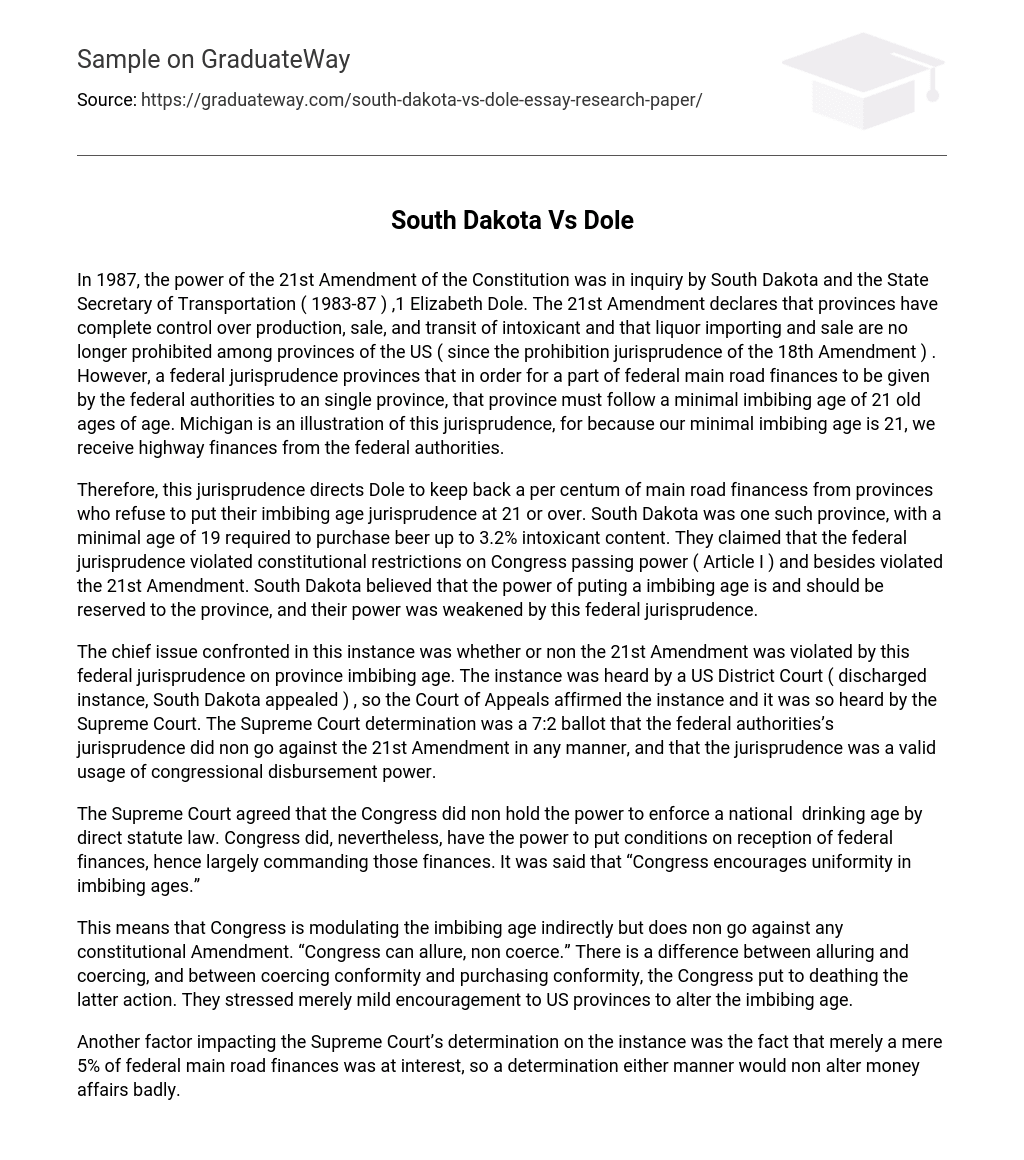In 1987, the power of the 21st Amendment of the Constitution was in inquiry by South Dakota and the State Secretary of Transportation ( 1983-87 ) ,1 Elizabeth Dole. The 21st Amendment declares that provinces have complete control over production, sale, and transit of intoxicant and that liquor importing and sale are no longer prohibited among provinces of the US ( since the prohibition jurisprudence of the 18th Amendment ) . However, a federal jurisprudence provinces that in order for a part of federal main road finances to be given by the federal authorities to an single province, that province must follow a minimal imbibing age of 21 old ages of age. Michigan is an illustration of this jurisprudence, for because our minimal imbibing age is 21, we receive highway finances from the federal authorities.
Therefore, this jurisprudence directs Dole to keep back a per centum of main road financess from provinces who refuse to put their imbibing age jurisprudence at 21 or over. South Dakota was one such province, with a minimal age of 19 required to purchase beer up to 3.2% intoxicant content. They claimed that the federal jurisprudence violated constitutional restrictions on Congress passing power ( Article I ) and besides violated the 21st Amendment. South Dakota believed that the power of puting a imbibing age is and should be reserved to the province, and their power was weakened by this federal jurisprudence.
The chief issue confronted in this instance was whether or non the 21st Amendment was violated by this federal jurisprudence on province imbibing age. The instance was heard by a US District Court ( discharged instance, South Dakota appealed ) , so the Court of Appeals affirmed the instance and it was so heard by the Supreme Court. The Supreme Court determination was a 7:2 ballot that the federal authorities’s jurisprudence did non go against the 21st Amendment in any manner, and that the jurisprudence was a valid usage of congressional disbursement power.
The Supreme Court agreed that the Congress did non hold the power to enforce a national drinking age by direct statute law. Congress did, nevertheless, have the power to put conditions on reception of federal finances, hence largely commanding those finances. It was said that “Congress encourages uniformity in imbibing ages.”
This means that Congress is modulating the imbibing age indirectly but does non go against any constitutional Amendment. “Congress can allure, non coerce.” There is a difference between alluring and coercing, and between coercing conformity and purchasing conformity, the Congress put to deathing the latter action. They stressed merely mild encouragement to US provinces to alter the imbibing age.
Another factor impacting the Supreme Court’s determination on the instance was the fact that merely a mere 5% of federal main road finances was at interest, so a determination either manner would non alter money affairs badly. Besides, the determination satisfies the demand for congressional disbursement for the “general public assistance” of the provinces, non for personal promotion but for the betterment of the US as a whole.
One point that the federal authorities was seeking to emphasize with their main road fund/ imbibing age jurisprudence was that the deficiency of uniformity among US province imbibing age Torahs was an interstate job, and a unsafe 1 every bit good. The Congress wished to happen uniformity within a imbibing age jurisprudence, or modulate the sale and commercialism of spirits in another manner. However they could merely make this by indirect agencies.
The instance of South Dakota vs. Dole ended with the determination that the federal jurisprudence backed by Dole was non a misdemeanor of the 21st Amendment used by South Dakota. Therefore, in order to have federal main road finances, South Dakota must follow with the federal jurisprudence and raise their minimal imbibing age to 21 old ages of age.
Plants Cited
- “Dole, Elizabeth.” Compton’s Synergistic Encyclopedia. Copyright 1996. Softkey Multimedia Inc. ( computing machine )
- United States Government: Democracy in Action. Glencoe, pp. 103-4.





